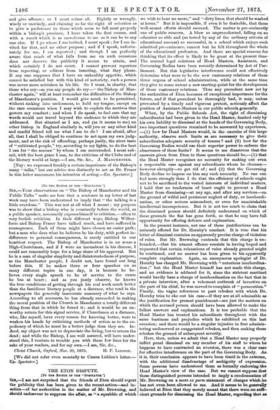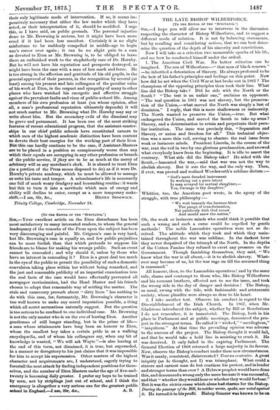THE ETON DISPUTE.
[TO THE EDITOR 01 TH7 " SPIIIMATOIL1
am not surprised that the friends of Eton should regret the publicity that has been given to the recent action—and in- action—of her authorities in the matter of Mr. Browning, and should endeavour to suppress the affair, as " a squabble of which we wish to hear no more," and " dirty linen that should be washed at home." But it is impossible, if even it be desirable, that these well-meant efforts should succeed. The matter is pre-eminently one of public concern. A blow so unprecedented, falling on an educator so able and (as tested by any of the ordinary criteria of educational success) so successful, in a school which enjoys such admitted pre-eminence, cannot but be felt throughout the whole of the educational profession. And there are special reasons for thinking that its effect is likely to be great at the present time- The mutual legal relations of Head Masters, Assistants, and Governing Bodies have been recently determined by Act of Par- liament. But this legislative interference could not effectively determine what were to be the new customary relations of these- three organs of school administration, while at the same time they give to some extent a new starting-point for the development of these customary relations. Thus any precedent now set by the authorities of Eton becomes of exceptional importance for the future, and if that precedent be thoroughly bad, it may, unless prevented by a timely and vigorous protest, serionslyaffect position of Assistant-Masters in our public schools,generally.
When, by the Public Schools Act, the right of dismissing subordinates had been given to the Head Master, limited only by his own liability to dismissal at the hands of the Governing Body,. _two important questions remained to be answered by experience,- -(1) how far Head Masters would, in the exercise of this large authority, observe such limits as are necessary to give their subordinates adequate security of tenure ? and (2) how far the- Governing Bodies would use their superior power to enforce the- observance of these limits? It seems to me disastrous thatthe answers given from Eton to these questions should be,—(1) that the Head Master recognises no necessity for making out even a respectable case against any subordinate whom he chooses— however abruptly—to get rid of ; and (2) that the Governing Body decline to impose on him any such necessity. No one can' feel more strongly than I do that the efficiency of schools ought not to be sacrificed to the vested interests of individual masters. I hold that no tenderness of heart ought to prevent a Head Master from dismissing—at any age, and after any services—on the ground of wilful and persistent neglect of duty, or insubordi- nation, or other serious misconduct, or even for unmistakable- intellectual incompetence. But it is not too much to claim that the dismissed person should definitely understand on which of these grounds the flat has gone forth, so that he may have full opportunity for offering defence and explanation.
In the present instance, not one of these justifications can be seriously offered for Dr. Hornby's conduct. It is true that his letter of dismissal contains an apparently precise charge of violation of rules. But Mr. Browning contends that this charge is un- founded,—that his utmost offence consists in having hoped and requested that certain relaxations of rules already granted might be continued, and no answer has been given to his apparently complete explanation. Again, an anonymous apologist of Dr.- Hornby has charged Mr. Browning with " notorious insubordina- tion ;" but the Head Master himself has not made this charge, and no evidence is adduced for it, since the strictest martinet would hardly base a charge of insubordination on the fact that in a private interview, after a vehement outbreak of invective on. the part of his chief, he was moved to complain of " persecution.'f Finally, the vague references to past rebukes with which Dr._ Hornby tries to eke out his case—if they are at all admissible as- the justification for present punishment—are just the matters on which the accused person should have been allowed to make the fullest answers and explanations. It is too probable that the Head Master has treated his subordinate throughout with the- same hastiness and prejudice which he exhibited on this last occasion; and there would be a singular injustice in first adminis- tering undeserved or exaggerated rebukes, and then making these- rebukes the ground of subsequent severity.
Here, then, unless we admit that a Head Master may properly inflict penal dismissal- on any member of his staff to whom happens to have contracted an aversion, there was a clear case- for effective interference on the part of the. Governing Body. A's- it is, their conclusion appears to have been timid in the extreme, with the additional disadvantage of ambiguity of expression.. Some persons have understood them as formally endorsing,the- Head Master's view of the case. But we cannot suppose,that these distinguished persons intended to imply a condemnation of Mr. Browning on a mere ex parte statement of charges which he has not even been allowed to see. And it seems to be generally believed at Eton that they merely meant that there weretno suffi- cient grounds for dismissing the Head Master, regarding that as their only legitimate mode of intervention. If so, it seems im- peratively necessary that either the law under which they have acted,- or their interpretation of it, should be modified. I urge this, as I have said, on public grounds. The personal injustice done to Mr. Browning is serious, but it might have been more cruel if it had been less manifest. Certainly it is no slight misfortune to be suddenly compelled in middle-age to begin one's career over again ; it can be no slight pain to a man so devoted to Eton as Mr. Browning is, to be obliged to leave there an unfinished work to the stepfatherly care of Dr. Hornby. But he will not have his reputation and prospects destroyed, as might have been the case with a man of less mark and force. He is-too strong in the affection and gratitude of his old pupils, in the general approval of their parents, in the recognition by several (at least) among his present and late colleagues of the peculiar value -of his work at Eton, in the respect and sympathy of many in other places who have watched his energetic and effective struggle .against the prevalent faults and vices of public-school life. Among members of his own profession at least (on whose opinion, after all, a' man's professional reputation ultimately depends) it will -not much matter to Mr. Browning what Dr. Hornby may say or write about him. But the secondary evils of the dismissal may be grave and permanent. It has been one of the most striking features of recent educational progress, that the assistant-master- ships' in our chief public schools have constituted careers to which men of the highest academic distinction have been content to devote their best energies for the working part of their lives. Bat.this can hardly continue to be the case, if Assistant-Masters are to be placed in a position so conspicuously worse than any which their equals are occupying in any other profession or branch -of the public service, if they are to be as much at the mercy of arbitrary will as any merchant's clerk. It is absurd to treat Eton (as a portion of the Press seems disposed to do) as if it were Dr. Hornby's private academy, which he must be allowed to manage as snits his taste and temper. A schoolmaster's life is necessarily one full of much weary drudgery and benumbing routine: it wants but this to turn it into a servitude which men of energy and ability will decline to enter, except as a mere temporary make-
shift.—I am, Sir, &c., HEIMY SIDGWICK. Trinity College, Cambridge, November 24.



































 Previous page
Previous page